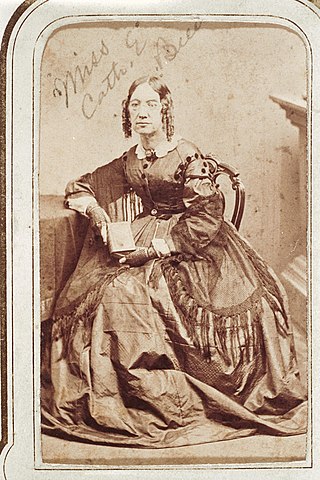Author Bibliography (in progress)
Beecher, Catharine Esther (1800-1878)
BIOGRAPHICAL NOTE
 Catharine Esther Beecher (6 September 1800 - 12 May 1878) was a daughter of the prominent New England minister Lyman Beecher, a sister of the Abolitionist Henry Ward Beecher, and sister to Harriet Beecher Stowe with whom she was an occasional co-author. Both Harriet and Catharine are great-aunts of Charlotte Perkins Gilman. During her lifetime Beecher was best known as a teacher and promoter of access to education for women, though her reformist ideas were conservative. Underlying her writing is Beecher's interpretation of the Bible as an injunction to women to be submissive to their husbands, while husbands should treat their wives as “the weaker vessel” and protect them and give them precedence. In this way, according to Beecher, a power balance between the genders is achieved. This belief in modesty and virtue, and submission to the trials of God, guides all of her texts: she argues against suffrage and women’s rights as unchristian and disruptive to the balance of family and society. Regarding Abolition, she advocates "gradual emancipation," arguing that to make the case for the abolition of slavery through direct action will not work, that the case should be made by educating former slaves and impressing society with their meekness and humility. Thus, slave owners will become aware of the immorality of their actions of their own accord.
Catharine Esther Beecher (6 September 1800 - 12 May 1878) was a daughter of the prominent New England minister Lyman Beecher, a sister of the Abolitionist Henry Ward Beecher, and sister to Harriet Beecher Stowe with whom she was an occasional co-author. Both Harriet and Catharine are great-aunts of Charlotte Perkins Gilman. During her lifetime Beecher was best known as a teacher and promoter of access to education for women, though her reformist ideas were conservative. Underlying her writing is Beecher's interpretation of the Bible as an injunction to women to be submissive to their husbands, while husbands should treat their wives as “the weaker vessel” and protect them and give them precedence. In this way, according to Beecher, a power balance between the genders is achieved. This belief in modesty and virtue, and submission to the trials of God, guides all of her texts: she argues against suffrage and women’s rights as unchristian and disruptive to the balance of family and society. Regarding Abolition, she advocates "gradual emancipation," arguing that to make the case for the abolition of slavery through direct action will not work, that the case should be made by educating former slaves and impressing society with their meekness and humility. Thus, slave owners will become aware of the immorality of their actions of their own accord.
PUBLICATIONS
https://www.gutenberg.org/files/56090/56090-h/56090-h.htm
Last updated on July 11th, 2024
SNSF project 100015_204481
@VLS@veganism.social | VeganLiteraryStudies | @veganliterarystudies |
